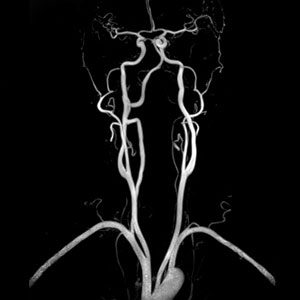MR angiography (MRA) is an MRI study of the blood vessels. It utilizes MRI technology to detect, diagnose and aid the treatment of heart disorders, stroke and blood vessel diseases. MRA provides detailed images of blood vessels without using any contrast material, although a special form of contrast material is often given to make the MRI images even clearer. The procedure is painless, and the magnetic field is not known to cause tissue damage of any kind.
Many patients with arterial disease now have it treated in the radiology department rather than undergoing surgery in an operating room. MRA is a very useful way of finding problems with blood vessels and determining how to best to treat those problems.
The carotid arteries in the neck that conduct blood to the brain are a common site of atherosclerosis, which may severely narrow or block off an artery, reducing blood flow to the brain and even causing a stroke. If an ultrasound study shows that such disease is present, many surgeons will perform the necessary operation after confirmation with MRA, dispensing with the need for catheter angiography.
MRA is also used to detect disease in the aorta and in blood vessels supplying the kidneys, lungs and legs.
Patients with a family history of arterial aneurysm, a ballooning out of a segment of the vessel wall, can be screened with MRA to see if they have a similar disorder that has not produced symptoms. If an aneurysm is found, it may be eliminated surgically, possibly avoiding serious or fatal bleeding.
For more information on the MRA procedure visit radiologyinfo.org (MRA).

